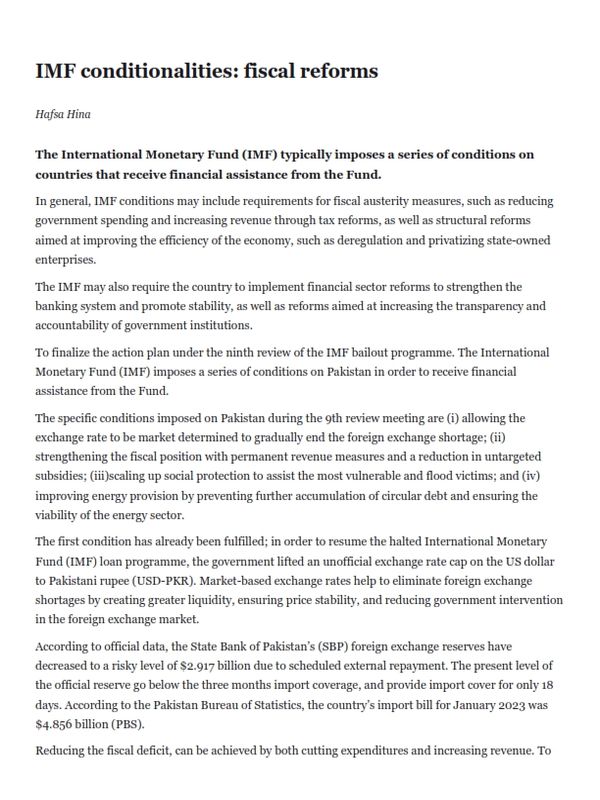IMF Conditionalities: Fiscal Reforms
The International Monetary Fund (IMF) typically imposes a series of conditions on countries that receive financial assistance from the Fund.
In general, IMF conditions may include requirements for fiscal austerity measures, such as reducing government spending and increasing revenue through tax reforms, as well as structural reforms aimed at improving the efficiency of the economy, such as deregulation and privatizing state-owned enterprises.
The IMF may also require the country to implement financial sector reforms to strengthen the banking system and promote stability, as well as reforms aimed at increasing the transparency and accountability of government institutions.
To finalize the action plan under the ninth review of the IMF bailout programme. The International Monetary Fund (IMF) imposes a series of conditions on Pakistan in order to receive financial assistance from the Fund.
The specific conditions imposed on Pakistan during the 9th review meeting are (i) allowing the exchange rate to be market determined to gradually end the foreign exchange shortage; (ii) strengthening the fiscal position with permanent revenue measures and a reduction in untargeted subsidies; (iii)scaling up social protection to assist the most vulnerable and flood victims; and (iv) improving energy provision by preventing further accumulation of circular debt and ensuring the viability of the energy sector.
The first condition has already been fulfilled; in order to resume the halted International Monetary Fund (IMF) loan programme, the government lifted an unofficial exchange rate cap on the US dollar to Pakistani rupee (USD-PKR). Market-based exchange rates help to eliminate foreign exchange shortages by creating greater liquidity, ensuring price stability, and reducing government intervention in the foreign exchange market.
According to official data, the State Bank of Pakistan’s (SBP) foreign exchange reserves have decreased to a risky level of $2.917 billion due to scheduled external repayment. The present level of the official reserve go below the three months import coverage, and provide import cover for only 18 days. According to the Pakistan Bureau of Statistics, the country’s import bill for January 2023 was $4.856 billion (PBS).
Reducing the fiscal deficit, can be achieved by both cutting expenditures and increasing revenue. To save government spending, the government could consider reducing or rationalizing subsidies in energy, agriculture and food. Agricultural subsidies, such as those for fertilizers and seeds, could be reduced or targeted more effectively to ensure that they reach the intended beneficiaries.
The government could consider reducing food subsidies, such as those for wheat, sugar, and edible oil, which are currently given to both the poor and wealthy. As per PIDE report, Pakistan’s government allocates approximately Rs 200 billion annually to subsidize fertilizers, which aim to provide affordable essential commodities (such as wheat, rice, maize, and sugar) to low-income groups.
However, the subsidy only results in an average family of five receiving a monetary benefit of Rs 893 per year (Rs 74 per month) for their consumption of 15 maunds of wheat, 2 maunds of rice, and 30 kg of sugar. Given the subsidy’s cost of Rs 200 billion, fertilizer subsidy is not an efficient policy to provide low prices in Pakistan.
PIDE debate on civil service reforms advises the government how to control its wage bill. The government could offer reducing perks and allowances to civil servants which would reduce the overall size of the workforce and reduce the wage bill.
The PIDE report states that there is a surplus of staff in grades 1-11, which currently accounts for 85% of the salary bill. By eliminating redundant positions, such as peons, finances can be saved, which could then be used to cover any additional expenses in the event of salary revisions.
The government could offer reducing perks and allowances to civil servants. The PIDE has suggested that civil servants’ salaries must be on a par with the comparable private-sector salaries. It proposes a strategy to monetize all perks such as, government housing assets, which are valued at approximately Rs 1.45 trillion.
By releasing these assets to the private sector, the government can realize their value and remove obstacles to growth while also eliminating welfare losses. Additionally, the use of official cars by senior civil servants should be discontinued, and instead, cars should be leased from banks.
The estimated value of cars used by officers in grades 20-22 in Islamabad is approximately Rs 1.53 billion, which could be used for other purposes if the transportation facility is monetized.
Unfortunately, we know the policies that aimed at improving the efficiency of the economy but due to lack of political will and weaknesses in institutions hinder the implementations. If Pakistan successfully obtains funding from the IMF can signal to international investors and the general public that Pakistan’s economy is on the path to stability and recovery, which can lead to increased confidence and investment in the country.
But, it is very clear that IMF programmes focus on stabilisation and crisis management rather than growth-oriented policies that require structural reforms.
Copyright Business Recorder, 2023




